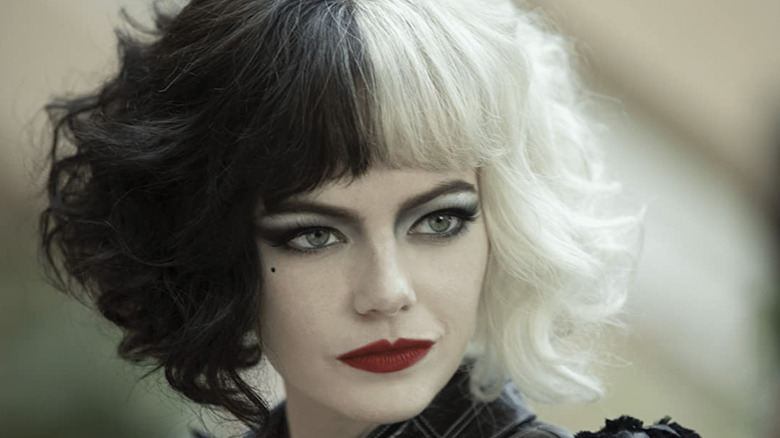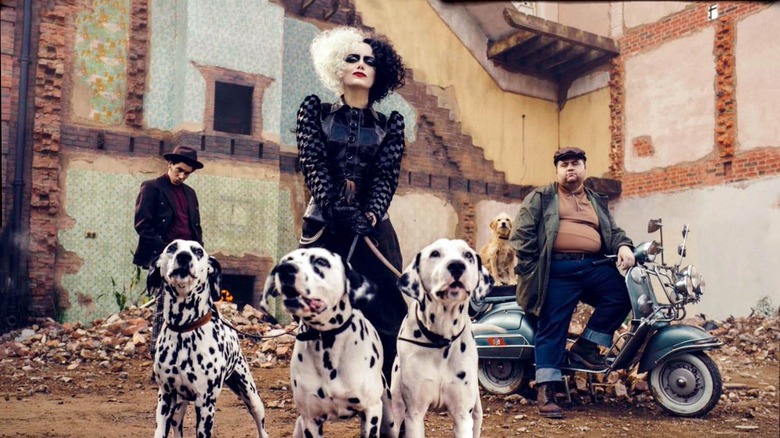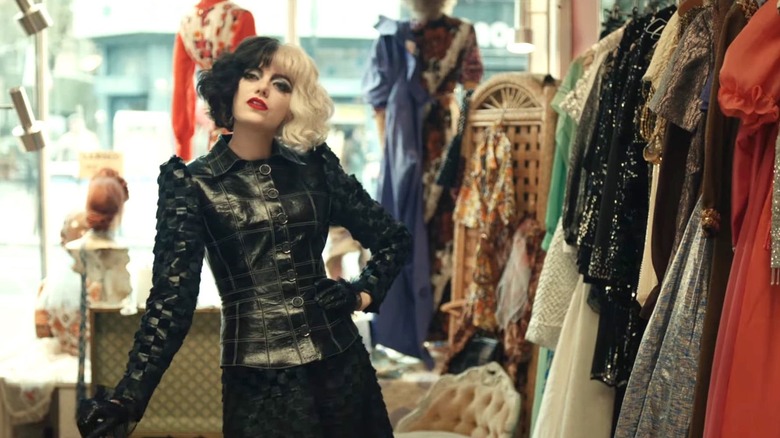Cruella Review: The De Vil You Don't
Disney has received its fair share of scorn over the last decade for double-dipping into their successful animated features with brand new live-action adaptations, remakes and reimaginings. But each outing has also raked in so much cold, hard cash that it's no surprise we keep getting more, regardless of critical reception. Their latest, "Cruella," starring Oscar winner Emma Stone as the title character, is at least a little further afield from retreads like "The Beauty & The Beast" or "The Lion King." Rather than repurpose what worked in "101 Dalmatians" (something Disney already did in 1996 with Glenn Close), this new film pulls from more disparate influences.
Initially pegged by cynics as "Joker" but for girlbosses, "Cruella" has more in common with "Wicked" due to its origins in shining a sympathetic light onto an iconic villain. But even more than that, "Cruella" owes quite a bit to "The Devil Wears Prada" with its core narrative of a wannabe fashion designer contending with her abusive boss. Hell, this film's small army of credited screenwriters even counts "Prada" scribe Aline Brosh McKenna among their ranks.
While this film's bloated runtime includes a handful of semi-effective narrative swerves (the specific details of which the powers that be at the House of Mouse would prefer not expanded upon within the confines of this, or any, review), it is nonetheless as straightforward and rote an exercise as its early detractors previously assumed. It is successful in babyfacing its historical heel star, powdering over a villainous future by re-contextualizing her past into something more palatable, the sort of scrappy underdog story everyone can agree on. But it provides little more to chew on than reaffirming already known qualities, like Stone's effervescent charm and director Craig Gillespie's efficacy for centering non-traditional protagonists.
But is that enough to sit through a two and a half hour movie that amounts to little more than a stylish sob story about a lady who likes to turn dogs into coats?
Who ever heard of a fashion show without fashions?
Were you asked to guess the plot, style and tone of "Cruella" after being given only the barest premise, there's a strong chance even the random layman could accurately sketch the finished product in a few minutes or less. In the broadest terms, it's an origin story, told with acidic and knowing voice-over narration from Stone's present day Cruella, with non-stop needle drops, persistently roving camera work and a treasure trove of Easter eggs for eagle-eyed Disney fans. It definitely ticks all the right boxes for its intended audience, but provides almost nothing beyond red meat for the base.
The film follows Stella, as its main character was once known, from her tortured upbringing to her early years as a thief, all the way to her apprenticeship at the hands of Baroness von Hellman (Emma Thompson), a sort of ur-Cruella who serves both as inspiration and antagonist for the villainess we all know. It's a story that takes turns between being about petty thievery and artistic reinvention, sometimes at the same time, but often alternating wildly.
"Cruella" in its most frustrating moments feels like a basic homework assignment a student transformed into a lengthy dissertation, born from some measure of insecurity at agreeing to such an easy layup in the first place. The plot is somehow both obvious and overcooked, hitting all the expected marks, but careering around wild turns that feel unnecessary for such a simple little film. It is exactly the sort of execution we have all grown to expect from a studio picture with seven credited writers that began as a silly idea before more and more creative horsepower was expended on it in attempts at turning fluff into substance.
Like a single-serve cupcake hidden beneath layers and layers of frosting, "Cruella" is, at its core, a sweet and enjoyable picture smothered by its overbearing presentation.
This is, it must be said, a movie whose score was composed by Nicholas Britell, one of the finest working composers in the industry ("Succession," "If Beale Street Could Talk"). But there are scant stretches of screentime where his work is actually heard. "Cruella" rarely makes it the length of a typical television ad break without punishing the ears with another broad appeal at pizzazz in the form of an expensive song audiences have already associated with some other, better film over the years. It feels like the music supervisor wanted to recreate the vibe Sofia Coppola carefully curated in "Marie Antoinette" but relied on an algorithmically programmed Spotify playlist instead of any actual personal choices.
That same feeling is present in most of the film's creative decisions. The budget allows Gillespie to turn every single scene, regardless of tenor, into an excuse to break out the dolly tracks or Steadicam. The result is a movie trying so hard to be stylish it accomplishes only the impression of style, the sense that this is supposed to be a feast for the eyes, while making little effort to prevent the viewer's lids from closing when the plot bores them to sleep.
Gowns...beautiful gowns...
If "Cruella" has a saving grace, it's in the delightful work of its lovely cast. If you can accept and ignore her atrocious English accent, Emma Stone is a force in the lead role. She brings the right amount of self-effacing magnetism and self-aware scenery chewing to the part. Stone knows she's playing one of Disney's biggest villains, but rather than go as big or broad as Close did in '96 (or '00's "102 Dalmatians"), she's able to swap back and forth between a base cartoonish quality and quirky introspection. (It helps, of course, that this narrative literally allows her the same space it gave the best Batman villains in '90s film adaptations, giving her the space to have a "secret identity" in addition to the outsized personality Cruella entails.)
But two and a half hours of Stone vamping wouldn't work nearly as well without Thompson's work as her antagonist. A handful of other big-name actors were considered for the part, but Thompson brings exactly the right mix of camp and cold calculation to the Baroness. Movies like this live or die by their cast's ability to know exactly what kind of movie they're making, so it's a blessing that, amid the iffy storytelling and brash design choices, the actors were able to make the best of it.
The supporting players slot nicely into the sort of roles one would expect from them, like Mark Strong as the Baroness's right-hand man, or Paul Walter Hauser's reinterpretation of Cruella's henchman Horace as an homage to Bob Hoskins' sterling work in Steven Spielberg's "Hook." Hauser's work as Horace and Joel Fry's turn as Jasper provide the film's biggest surprise. The relationship between that pair and Cruella is presented with such sincerity and heart that it's a shame the movie couldn't find more space to explore it.
A fair amount of ink will be spilled about Joel McCrea's Artie, who surfaces as Disney's eleventh or twelfth declaration of being the first gay character in one of their movies, but in an equally cynical grab for inclusivity, Cruella is given a Black best friend, played by Kirby Howell-Baptiste (who, herself, played a similarly cast-aside part on "The Good Place.") These two serve to remind audiences that even in a movie whose glam style and drag posturing owes a ton to marginalized communities, its inhabitants still remain on the outskirts of the narrative.
But even then, it feels like a heist in itself that these actors were all able to sneak in as much earnestness within the many moving parts of a movie this broad and gauche. It's the life they all breathe into this goofy characters that prevents the film from being an utter waste of time, giving enough intrigue from their interplay to help the rest of the film's many foibles feel easier to gloss over.
That said, shaving a good half hour from the runtime and chopping out at least a third of its soundtrack choices would go a long way toward improving "Cruella." Be honest with yourself. Even just from reading this review, you can probably already tell this is a movie that ends with the Rolling Stones' "Sympathy For The Devil," right?


